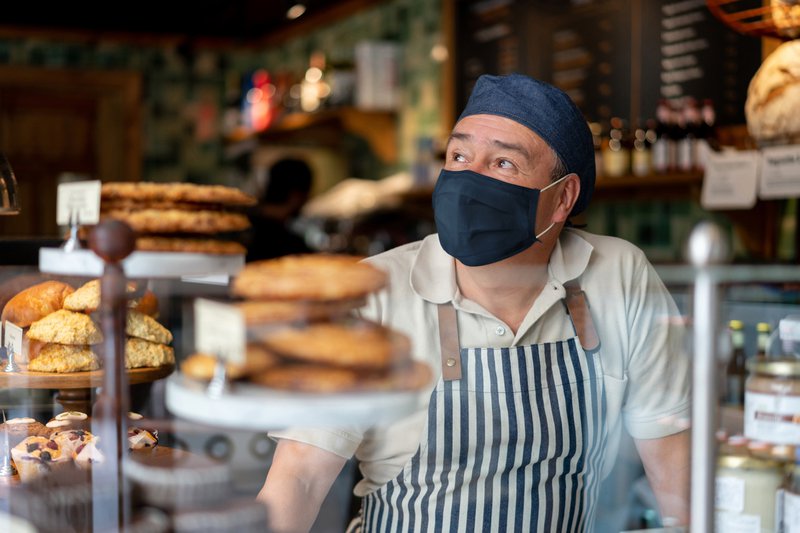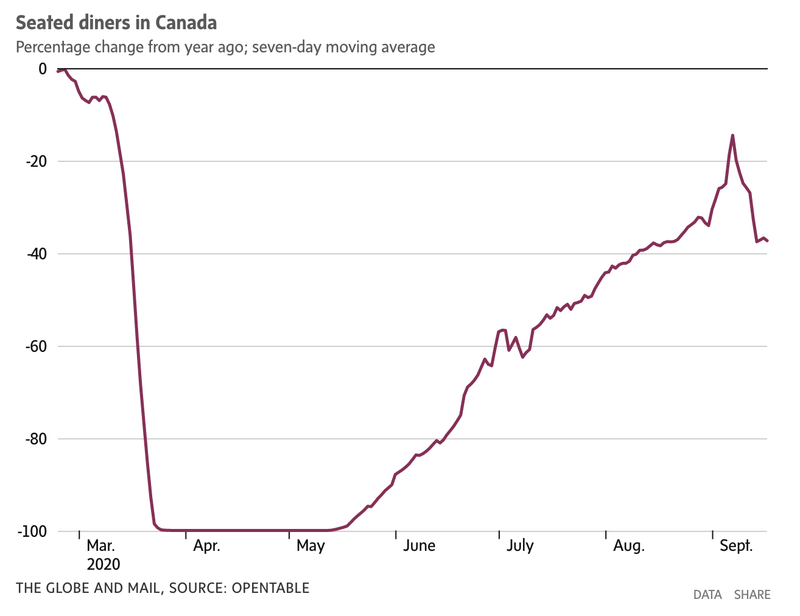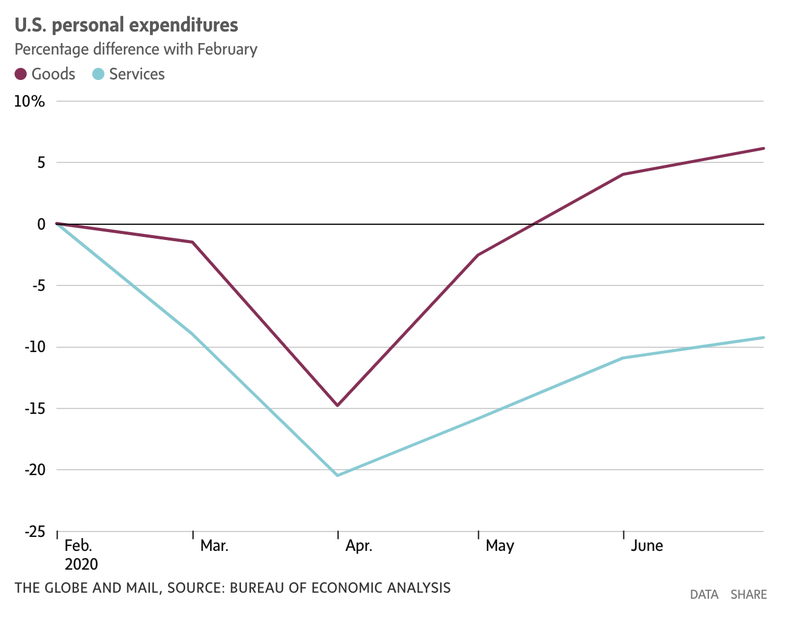
MATT LUNDY
Sept. 21, 2020
Canadians are shaking up their spending patterns during the COVID-19 pandemic, resulting in a two-track recovery for consumption: Sales of goods are thriving, while services are slumping.
During the second quarter, when the country was largely under lockdown, household spending declined 13.1 per cent in inflation-adjusted terms, according to Statistics Canada. The services sector dropped by twice as much (16.7 per cent) as the goods sector (8.4 per cent).
More recently, however, goods are riding high. Retailers sold $53-billion of merchandise in July – the highest month on record. As stores reopened this summer, pent-up demand led to an onslaught of sales and shortages of everything from kayaks to patio furniture.

On the services side, however, progress appears to be slower. Recent data point to continuing weakness in industries under tight restrictions, such as travel and entertainment, along with those where close interaction is unavoidable, such as restaurants and barber shops. With COVID-19 cases on the rise, service industries look vulnerable once again.
The services sector “is going to be the most affected” as cases increase again, National Bank of Canada economist Jocelyn Paquet said. “If you’re looking for the industries that are most likely to suffer again, just look at the industries that suffered the most the first time.”
After lockdowns began in March, consumer spending collapsed. While the summer months brought a rebound, many industries continue to languish. Spending on entertainment in late August was 13-per-cent lower than a year ago, according to Royal Bank of Canada card transactions. Travel was down 60 per cent.
As weather cools across the country, the hard-hit restaurant industry is living out the final weeks of its crucial patio season, given fears over indoor dining. Data from booking platform OpenTable suggest the number of seated diners in Canada has tumbled since Labour Day.

Those figures show an “overwhelming decline,” said Andrew Oliver, the president and chief executive officer of Oliver & Bonacini Hospitality, which has dozens of restaurants and event venues across the country. His company’s sales have improved since the height of lockdown restrictions, but are still down about 60 per cent from prepandemic levels.
“In what world is it better to be in the restaurant industry today than it was two months ago?” he asked. “The answer is it’s just simply not.”
At the expense of restaurants, grocery sales have been robust – in essence, a transfer of consumer spending from services to goods. Despite more dining options now being available, Sobeys parent company Empire Co. Ltd. sees the grocery bump continuing.
“It’s clear that many Canadians' food habits remain changed, and we predict they will stay changed due to the severity and length of COVID concerns,” CEO Michael Medline said on a recent earnings call.
In the United States, goods spending in July was 6-per-cent higher than in February, while services were down nearly 10 per cent. The U.S. data is a “good proxy” for what’s happening in Canada, Mr. Paquet at National Bank said.

In some cases, the demand is there, but safety precautions have put a cap on business.
Electra Health in Vancouver is close to fully booked for its health services, such as massage therapy and physiotherapy, owner Mark Bentz said. However, client volume is running at 70 per cent of normal, given that sanitization rules mean longer gaps between clients, and therefore fewer time slots.
“There’s a lot of time spent following all the protocols,” Mr. Bentz said. “It’s paid off, but volumes are down. We can’t fit any more people. We’d have to get more space.”
Another trouble is patient sickness leading to late cancellations, which could become a bigger threat this fall and winter. “If you’ve got a sniffle, we cancel your appointment,” Mr. Bentz said.
The day before Town Barber in Toronto was allowed to reopen in late June, thousands of booking requests flooded in, crashing its online system. “It was such chaos,” said Chris Hammell, the owner of two locations. “I just figured, this is going to be how it is going forward.”
But after a three-week rush, demand has tapered off and is weaker than usual, he said. At first, he was alarmed and phoned peers in British Columbia and Manitoba, where barber shops and hair salons were allowed to reopen earlier. He found they were seeing the same trend.
“The first week of September is normally nuts – kids going back to school, everybody at work,” Mr. Hammell said. “When I look out of both shops – [the] Queen Street [location], particularly – it’s just a different landscape. You’re looking around and there’s nobody out.”
Mr. Hammell has various theories for the demand hit. Some people have less money. Others are working from home and can make do with fewer cuts. Some customers have deserted the city, he added, while others delayed appointments, figuring it was fully booked. There’s also the prospect of health anxiety keeping people at home.
“I do like that people are being cautious,” Mr. Hammell said. “At the same time, businesses are in jeopardy of closing – it’s getting pretty scary.”
As a consequence of weaker demand, employment has been slower to rebound in some service industries, with food and accommodation being a standout laggard, down about 21 per cent from February, with culture and recreation down 13 per cent.
“The jobs and output that remain to be recovered are now heavily tilted to sectors where social distancing requirements pose major limitations on activity,” read a recent CIBC Capital Markets report.
At Town Barber, Mr. Hammell doesn’t foresee an imminent end to demand woes.
“I don’t think we’ll see a full rebound in the fall,” he said. “I do really worry about the fall and winter.”
This Globe and Mail article was legally licensed by AdvisorStream.
© Copyright 2024 The Globe and Mail Inc. All rights reserved.


